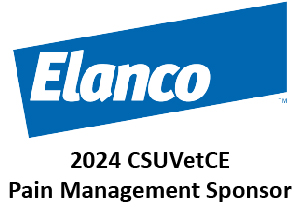Sponsored
Practical Lateral Fabellar Suture & Patellar Luxation - Veterinarians
June 22 - 23, 2024
EARLY BIRD PRICING EXTENDED! Register by 5/22/2024 to receive $200 off the regular price of $2195!
Course Description
We get it … you see plenty of dogs with cranial cruciate ligament disease (CrCLD) and patellar luxation (and sometimes both). But the fact is, they’re all different … different breeds, different lifestyles, different owner expectations / goals, different ages, different degrees of instability and tibial shapes … the list goes on. Referral to a specialist is a great answer for many of them, but we all know that barriers to referral exist for some clients. At the end of the day, you want to take great care of your valued clients … when does it make sense to offer corrective surgery and when is that a very bad idea?
We’ve got you covered! In this specially designed course, online learning modules will prepare you for your intensive hands-on training at the CSUVetCE center. You’ll enjoy the anywhere / anytime freedom of small “bite sized” online learning modules that allow you to learn at your pace, in your place, and when it is convenient for you.
Between your preparatory online learning and your in-person/hands-on training, you’ll learn to diagnose CrCLD as well as detect “the silent ExCap assassin” co-morbidities that will help you to steer clear of danger and client disappointment. You’ll learn to honestly educate your clients about the treatment options and their outcome with a simplified breakdown of the latest research. You’ll learn the risk factors for medial meniscal injury as well as how to visualize, probe and treat meniscal tears. You’ll learn the tricks and subtle nuances that will ease your confident placement of the LFS ExCap suture in the proper quasi-isometric sites. We will candidly discuss a 3-phase postop convalescent care plan designed to optimize your surgical outcomes.
Does your patellar luxation patient need a trochleoplasty … how about a tibial tuberosity transposition? What, step-by-step, are the easiest and safest ways to perform these procedures? In this course you’ll learn all that, plus how to identify cases that are predisposed to successful surgical outcomes as well learn to recognize those that are prone to complications. You’ll learn how to answer your common client questions and all the little surgical technique tricks that our friendly instructors have used in training their residents and 100’s of practicing vets just like you.
You’ll return to your practice with a whole new understanding and surgical skills for treatment of CrCL disease and patellar luxation. You’ll be eager to offer treatment when it makes sense and you’ll be wise enough to avoid those cases for which the predicted outcome is sketchy.
Limited to 1 technician per 1 veterinarian attending.
Register your technician here.
Access to this course will expire one year (365 days) from the course’s end date. After this period, users will no longer have access to course materials, resources, and any associated content. It is the responsibility of the users to complete the course and download any materials including their course completion certificate.
Category
Small Animal
Instructors
Dr. Ross H. Palmer
Dr. Clara Goh
Dr. Jess Barrera
Race Approved CE
24.0
Cost
$1,995.00
Course Type
Hybrid
Instructors
Dr. Ross H. Palmer
DVM, MS, Diplomate ACVS
Dr. Clara Goh
BVSc, MS, DACVS (Small Animal), ACVS Founding Fellow (Surgical Oncology)
Dr. Jess Barrera
DVM, DACVS, ACVS Fellow Surgical Oncology
Travel
Northern Colorado and the City of Fort Collins offer many great indoor and outdoor activities to explore. For an up-to-date list of activities, visit their website.
Policies
Participant Cancellation Policy: Course attendees can cancel their registration for an in-person course according to the following
- Cancellation more than 60 days prior: Full refund minus 10% processing fee or 100% Future Transfer Credit (FTC).
- Cancellation 30-60 days prior: 50% refund or 75% FTC.
- Cancellations within 30 days: 50% FTC only. Cancellations due to illness or other unforeseen circumstances will be considered on an individual basis.
- Future Transfer Credits can be applied to any course within 365 days of the cancelled course.
Course Cancellation Policy: Course cancellations due to low registration numbers or other circumstances may be announced 35 days or more prior to the course. Full refund of the course registration or 100% Future Transfer Credit (FTC) will apply. We are unable to reimburse for travel expenses incurred.
Course Access Policy:
Access to this course will expire one year (365 days) from the course’s end date. After this period, users will no longer have access to course materials, resources, and any associated content. It is the responsibility of the users to complete the course and download any materials including their course completion certificate.





